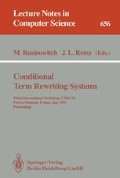Abstract
A novel representation of so-called critical-pair/completion procedures is introduced. This representation, by the means of category theory, serves to give a treatment procedures at as general a level as possible. First we give an overview of the fundamental notions in a systematic, axiomatic way, and then translate these notions into a categorical framework. The elements of the given universe (for instance terms, or polynomials) serve as objects in a category baptized CPC. Its arrows are the reductions in the universe (for instance rewrite rules, or reductions defined by polynomials from a given ideal). This category can alternatively be obtained by free generation from the underlying graph based on the reduction rules.
Substitutions (or multipliers) and embeddings into superpatterns, typical operations for all completion procedures, are viewed as functors onto the category itself.
The basic concepts involved in critical-pair/completion algorithms are modeled by well-known categorical concepts, to form a basis for the analysis of the differences and essential correspondences between the various critical-pair/completion algorithms.
Sponsored by the Austrian Ministry of Science and Research (BMWF), ESPRIT BRA 3125 ”MEDLAR”
I would like to thank Bruno Buchberger and Jochen Pfalzgraf for many helpful remarks and discussions.
Preview
Unable to display preview. Download preview PDF.
References
David B. Benson. The basic algebraic structures in the categories of derivations. Information and Control, 28:1–29, 1975.
Bruno Buchberger and Rudiger Loos. Algebraic simplication. Computing, Supplement 4:11–43, 1982. Appeared as report CAMP 82-12.0, RISC, Linz, Austria.
Bruno Buchberger. Ein Algorithmus zum Auffinden der Basiselemente des Restklassenringes nach einem nulldimensionalen Polynomideal. PhD thesis, Universität Innsbruck, 1965.
Bruno Buchberger. A critical-pair/completion algorithm in reduction rings. CAMP-Technical Report 83-21.0, Universität. Linz, 1983.
Bruno Buchberger. Gröbner bases: An algorithmic method in polynomial ideal theory. In N.K. Bose, editor, Recent Trends in Multidimensional Systems Theory, chapter 6, pages 184–232. Reidel, Dordrecht, The Netherlands, 1983.
Bruno Buchberger. Basic features and development of the critical-pair/completion procedure. In Jean-Pierre Jouannaud, editor, Proc. First Int. Conf. RTA, LNCS 202, pages 1–45, Dijon, 1985. Springer Verlag.
Nachum Dershowitz and Jean-Pierre Jouannaud. Rewriting systems. In J. van Leeuwen, editor, Handbook of Theoretical Computer Science, pages 243–320. Elsevier Publishers, Amsterdam, 1990.
Gérard Huet and Jean-Jacques Lévy. Call by need computations in non-ambiguous linear term rewriting systems. Rapport Laboria 359, IRIA, August 1979.
Gérard Huet. A complete proof of correctness of the Knuth-Bendix completion algorithm. Journal of Computer and System Sciences, 23(1):11–21, 1981.
Gérard Huet. Formal structures for computation and deduction. Working material for lectures at the International Summer School on Logic of Programming and Calculi of Discrete Design in Marktoberdorf, Germany, July 29–August 10 1986.
Michael Johnson. Pasting Diagrams in n-Calegories with Applications to Coherence Theorems and Categories of Paths. PhD thesis, University of Sydney, 1987.
Michael Johnson. Linear term rewriting systems are higher dimensional string rewriting systems. In C.M.I. Rattray and R.G. Clark, editors, The Unified Computation Laboratory, pages 3–12. Oxford University Press, 1991.
Donald E. Knuth and Peter B. Bendix. Simple word problems in universal algebras. In J. Leech, editor, Computational Problems in Abstract Algebra, pages 263–298, Oxford, 1967. Pergamon Press. Appeared 1970.
Jan Willem Klop. Combinatory Reduction Systems. PhD thesis, Mathematisch Centrum, Amsterdam, 1980.
Jan Willem Klop. Term rewriting systems. Technical Report CS-R9073, Centrum voor Wiskunde en Informatica, Amsterdam, 1990.
Joachim Lambek. From λ-calculus to cartesian closed categories. In James Paul Seldin and James Roger Hindley, editors, To H. B. Curry: Essays on Combinatory Logic, Lambda Calculus and Formalism, pages 375–402. Academic Press, 1980.
Jean-Jacques Lévy. Réductions correctes et optimales dans le λ-calcul. Thèse d'Etat, Université de Paris VII, 1978.
Joachim Lambek and P.J. Scott. Introduction to Higher-Order Categorical Logic, volume 7 of Cambridge Studies in Advanced Mathematics. Cambridge University Press, 1986.
Saunders MacLane. Categories for the Working Mathematician, volume 5 of Graduate Texts in Mathematics. Springer Verlag, 1971.
Aart Middeldorp and Mirjana Starčević. A rewrite approach to polynomial ideal theory. Technical Report CS-R9160, Centrum voor Wiskunde en Informatica, Amsterdam, 1991.
Elaine Rich. Artificial Intelligence. McGraw-Hill, London, 1983.
John Alan Robinson. A machine-oriented logic based on the resolution principle. Journal of the ACM, 12(1):23–41, 1965.
Karel Stokkermans. A categorical approach to critical-pair/completion procedures. Technical Report 91-58.0, RISC-Linz, J. Kepler University, Linz, Austria, Europe, December 1991. Literature Survey and Work Plan for Ph.D Thesis.
Åke Wikström. Functional Programming Using Standard ML. Prentice Hall International, Hemel Hempstead, United Kingdom, 1987.
Author information
Authors and Affiliations
Editor information
Rights and permissions
Copyright information
© 1993 Springer-Verlag Berlin Heidelberg
About this paper
Cite this paper
Stokkermans, K. (1993). A categorical formulation for critical-pair/completion procedures. In: Rusinowitch, M., Rémy, JL. (eds) Conditional Term Rewriting Systems. CTRS 1992. Lecture Notes in Computer Science, vol 656. Springer, Berlin, Heidelberg. https://doi.org/10.1007/3-540-56393-8_25
Download citation
DOI: https://doi.org/10.1007/3-540-56393-8_25
Published:
Publisher Name: Springer, Berlin, Heidelberg
Print ISBN: 978-3-540-56393-8
Online ISBN: 978-3-540-47549-1
eBook Packages: Springer Book Archive

